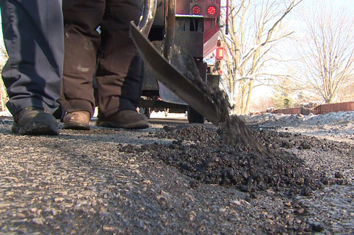Subscriber Benefit
As a subscriber you can listen to articles at work, in the car, or while you work out. Subscribe NowIndianapolis Mayor Joe Hogsett on Friday morning announced he would seek to spend an additional $14 million to repair the city’s roads and the potholes that litter them.
Hogsett issued an emergency declaration to allow the Department of Public Works to address the roads and will ask the City-County Council at its next meeting to draw down the remaining $13 million in the city’s rainy day fund and direct all the dollars there to road repair. An additional $1 million will come from unspent funds from 2017.
Hogsett called the condition of the roads “deplorable” and vowed to “return our streets to safe, passable condition.” Since Jan. 1., the city has received more than 12,000 repair requests for potholes.
“We will not rest until our roads are restored … until our residents are confident that Indianapolis is the best place to live, work, play and commute," he said.
Hogsett also called for the state legislature to have a conversation about "equitable" taxation to address problems that he said were "decades in the making." He said he was sensitive to the stigma of the term "commuter tax" but that he didn't think it was acceptable that "Marion County residents bear the burden alone" when there are 150,000 people from outside the county who drive on the city's roads each day but whose taxes don't pay for upkeep.
Hogsett and his administration say the city’s poor road conditions have been brought on by rapidly fluctuating winter temperatures in recent weeks, ranging from -12 degrees to 77 degrees on Tuesday.
“It is that extreme temperature fluctuation … that inflicted extensive damage to roads and vehicles,” Hogsett said.
The rainy day money comes from a one-time $52 million burst of cash the city received from the state in 2016, in the form of returned local option income tax revenue. Already the city has put $39 million of that money into its four-year transportation funding plan. Drawing down $13 million from the rainy day fund would empty it.
“We put aside millions so we could be prepared to deal with an emergency when it came,” Hogsett said. “The time to act is now."
Hogsett also asked the council to suspend normal procedural rules so it can pass the proposal the night it is introduced: March 12.
President Vop Osili said he believes the proposal will have wide support in the council.
Since the poor road conditions have been affecting constituents in all council districts, Osili said, “I’m curious if anyone would dare” vote against more road funding.
The $14 million will come on top of the city’s $88 million road funding budget for 2018.
Department of Public Works Director Dan Parker said the administration wanted to make sure it funded all of the already-planned neighborhood and city road resurfacing projects.
Parker told the mayor that he would have to eliminate projects in order to repair roads from the winter damage without new money, which they didn’t want to do.
He also said the new revenue would go beyond just filling potholes. About 50 lane miles of the worst roads will be “strip-patched,” he said, which means that the crews will be able to “remove significant sections of poor pavement, replacing the area with permanent smooth asphalt patch.”
Please enable JavaScript to view this content.

